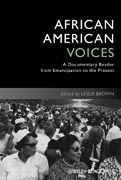
Compelling and enlightening, this collection of primary source documents allows twenty–first century students to ‘direct dial’ key figures in African–American history. It includes concise and perceptive commentary along with engaging suggestions for discussion and project work. • Examines key themes from multiple perspectives • Features a diverse range of voices that cut across class and political affiliations as well as across regions and generations • Chronological and thematic coverage from emancipation to the current day • Primary source documents include everything from letters and speeches to photographs, rap lyrics and newspaper reports • Incorporates recent as well as traditional historical interpretations • Classroom–ready text which includes keynotes on documents, differentiated material and engaging discussion questions INDICE: Introduction Chapter 1: Freedom, 1865–1881 1. Black Ministers Meet With Representatives of the Federal Government, 1865 2. Frederick Douglass Argues for Black Suffrage, 1865 3. Jordan Anderson Writes to His Old Master, 1865 4. Harriet Simril Testifies Before a Congressional Committee, 1871 5. Resolutions of the National Civil Rights Convention, 1873 6. The Exodusters, 1878 7. Black Women Demand a Living Wage, 1866 and 1881. Chapter 2: Upbuilding, 1893–1910 1. Ida B. Wells Speaks Out Against Lynching in the South, 1893 2. Booker T. Washington Speaks on Race at Atlanta, 1895 3. The National Association of Colored Women, 1897–98 4. The National Negro Anthem, 1900 and 1905 5. Photographs from the Paris Exposition, 1900 6. The Souls of Black Folk, 1903 7. Black Leaders Disagree with Booker T. Washington, 1905 8. Jack Johnson, 1910 Chapter 3: Migration, 1904–1917 1. Voices from the Independent, 1904 and 1912 2. Letters of Negro Migrants, 1916–7 3. The East St. Louis Riot, 1917 4. Why African Americans Left the South, 1919 Chapter 4: Determination, 1919–1925 1. W. E. B. Du Bois on African Americans and World War I, 1919 2. Poet Claude McKay Sets a New Tone, 1919 3. Emmett J. Scott Reflects on “What the Negro Got Out of the War,” 1919 4. Program of the NAACP, 1919 5. Marcus Garvey Outlines the Rights of Black Peoples, 1920 6. Cyril V. Briggs Merges Race Consciousness with Class Consciousness, 1922 7. Alain Locke Describes “The New Negro,” 1925 8. Langston Hughes on Being Black in America, 1925 9. Amy Jacques Garvey Calls on Women to Lead, 1925 Chapter 5: Resistance, 1932–1939 1. The Scottsboro Boys Write to the Workers of the World, 1932 2. Angelo Herndon Joins the Communist Party, 1934 3. Ella Baker and Marvel Cooke Report on “The Bronx Slave Market,” 1935 4. Richard Wright Observes a Black Response to Joe Louis’ Victory, 1935 5. The Southern Negro Youth Congress on Freedom, Equality, and Opportunity, 1937 6. The Coordinating Committee for Employment, New York, 1938 7. Marian Anderson at the Lincoln Memorial, 1939 Chapter 6: Resolve, 1942–1952 1. March on Washington Movement, 1941 2. Double V Campaign, 1942 3. A Black Army Chaplain Protests the Treatment of Black Soldiers, 1944 4. Pauli Murray on Protests in Washington, D.C., 1944 5. The Civil Rights Congress Charges the U.S. with Genocide, 1951 6. African Americans Petition the President and the American U.N. Delegation, 1952 Chapter 7: Discontent, 1953–1959 1. Thurgood Marshall Reargues Brown v. Board of Education, 1953 2. Zora Neale Hurston Expressed Doubts about Brown, 1955 3. The Montgomery Bus Boycott, 1955 4. Martin Luther King, Jr., Writes on Nonviolence, 1957 5. Robert F. Williams Advocates Armed Self–Defense, 1959 Chapter 8: Revolt, 1960–1963 1. Young Activists Form the Student Nonviolent Coordinating Committee, 1960 2. Ella Baker Reports on the Founding of SNCC, 1960 3. Bob Moses Writes from Jail in Magnolia, Mississippi, 1961 4. The Freedom Rides (1962) 6. Bernice Johnson Reagon Joins the Movement, 1961 7. Martin Luther King, Jr., Writes a Letter from Birmingham Jail, 1963 8. The March on Washington for Jobs and Freedom, 1963 Chapter 9: Power, 1964–1966 1. Malcolm X Reflects on the Approaches African Americans Must Use, 1964 2. Fannie Lou Hamer Testifies on Behalf of the Mississippi Freedom Democratic Party, 1964 3. Bayard Rustin Considers the Future of the Movement, 1965 4. Stokely Carmichael Explains Black Power, 1966 Chapter 10: Revolution, 1966–1977 1. Black Panther Party Articulates a Platform, 1966 2. Rev. Dr. Martin Luther King, Jr., Opposes the War in Vietnam, 1967 3. The Poor People’s Campaign, 1968 4. The Black Panther Party Convenes a Revolutionary People’s Constitutional Convention, 1970 5. Gil Scott Heron Warns that the Revolution Will Not Be Televised, 1971 6. Combahee River Statement Explains Black Feminism, 1977 Chapter 11: Crosscurrents (1980–2000) 1. Activists Call for Americans to Break Ties with South Africa, 1980 2. Toxic Wastes and Race in the United States, 1987 3. Jesse Jackson Rouses the Democratic Party, 1988 4. African American Women In Defense of Ourselves, 1991 5. Maxine Waters Explains the Causes of Urban Crises to Congress, 1992 6. The Million Man March, 1995 7. Angela Davis Describes the Prison–Industrial Complex, 1995 8. The Hip Hop Summit Action Network, 2001 Chapter 12: Paradox, 2005–Present 1. New Orleans Mayor Ray Nagin Addresses His City on Martin Lither King Day, 2006 2. Barack Obama Believes in “A More Perfect Union,” 2008 3. Julian Bond Reflects on Race and History in America, 2011 4. Melissa Harris–Perry Writes on Race in the 21st Century
- ISBN: 978-1-4443-3941-3
- Editorial: John Wiley & Sons
- Encuadernacion: Rústica
- Páginas: 344
- Fecha Publicación: 14/01/2014
- Nº Volúmenes: 1
- Idioma: Inglés
